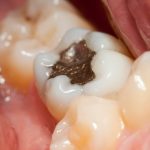FDA scientific advisory panel concluded that amalgam is not safe, yet no action taken
 (NaturalHealth365) “Dental amalgam is a mixture of metals, consisting of [liquid mercury] and a powdered alloy composed of silver, tin, and copper. Approximately 50% of dental amalgam is elemental mercury by weight” (emphasis ours). This information comes straight from the website of the U.S Food and Drug Administration (FDA). You read that correctly, by the way: HALF of dental amalgam fillings are made with mercury!
(NaturalHealth365) “Dental amalgam is a mixture of metals, consisting of [liquid mercury] and a powdered alloy composed of silver, tin, and copper. Approximately 50% of dental amalgam is elemental mercury by weight” (emphasis ours). This information comes straight from the website of the U.S Food and Drug Administration (FDA). You read that correctly, by the way: HALF of dental amalgam fillings are made with mercury!
Amalgams were long considered essential for dental health by conventional dentists, despite the well-known negative effects of mercury on the human body. Yet even with a recent admission from an advisory panel from the FDA itself, we are waiting on definitive action to have this known toxicant banned from dental care.
Despite expert panels agreeing that mercury amalgam isn’t safe, dentists still use this material in the mouths of adults and children
In November 2019, the Scientific Advisory Committee for the FDA concluded that amalgam is not safe for children, breastfeeding infants, and unborn children (via exposure from amalgams in pregnant women), given that this mercury-laden material is a proven neurotoxic agent.
You can learn more about it, including the hard work of concerned citizens and experts who helped bring this issue to the table, by watching this powerful 8 minute video:
Where is the mercury ban or amalgam phase-out that this expert panel so roundly supported?
Discover a Simple and Effective Way to Remove Toxins: This is Jonathan's #1 choice for at-home detoxification. Special offer ends Feb. 16.
Why are dentists still able to use dental mercury fillings on their patients, especially those from the most vulnerable and at-risk populations? Why are patients not being properly warned about how much mercury is in their fillings and what it can do to their bodies or even their children’s bodies?
We can at least report that Maine recently became the first in nation to require conformed consent before amalgam use. But that’s just a first step in the right direction.
Is the writing finally on the (dentist office) wall for amalgam? The link between mercury and its damaging health effects are well-supported
It’s time the FDA takes a stand on this medical and ethical issue, and go beyond just talking the talk – future generations are at risk. After all, other countries including Sweden, Denmark and Norway, have already banned mercury based fillings.
When will the U.S. catch up?
Even today on their website, the FDA presents conflicting information. They acknowledge that mercury from dental amalgam is “bioacculumative,” meaning it can build up in human tissues. Yet they immediately attempt to assure the reader there no evidence linking mercury bioaccumulation from amalgams to organ damage.
The glaring problem is that this kind of evidence does exist. Consider a 2011 paper published in the Journal of Occupational Medicine and Toxicology in response to a report from the European Commission. In it, the author cites hundreds of studies and makes several research-supported points, such as:
- Body tissues of people with dental amalgams have up to 12 times more mercury as identified on autopsy
- Autopsy studies have also revealed toxic levels of mercury in the brains and kidneys of these individuals
- The half-life of mercury in the brain can last for decades
- Mercury exposure has been associated with DNA damage in cells (a major first-step in cancer development), autoimmune diseases like multiple sclerosis and lupus, and other health conditions
This paper was written in response to a report from the SCENIHR (Scientific Committee on Emerging and Newly Identified Health Risks) which claimed that amalgams are safe. Aside from debunking many of SCENIHR’s claims, the author also adds that “most studies cited by SCENIHR which conclude that amalgam fillings are safe have severe methodical flaws.”
The evidence is there and experts continue to make their voices heard. If you want to help, respectfully write to your representatives, including the FDA’s Director for Devices and Radiological Health, Dr. Jeff Shuren.
Here is Dr. Shuren’s contact info, as provided by the Campaign for Mercury Free Dentistry:
Dr. Jeff Shuren, Director
Center for Devices, U.S. FDA,
10903 New Hamshpire Avenue
WO66-5431, Room 5442
Silver Spring, MD 20993-0002
Telephone: 301-796-5900
Email: [email protected]
Sources for this article include:



